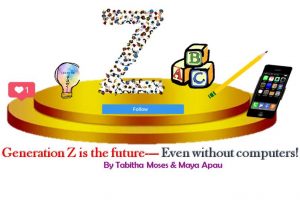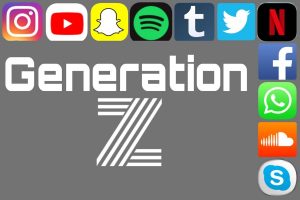What has our generation lost? Gen Z is in trouble
October 23, 2018
Are you reading this story on your phone? What would life be like without phones and social media?
Electronics have had many benefits to daily life, such as quick access to information, fast communication, and entertainment. However, alongside these benefits comes an increasing lack of social and life skills. These sometimes include a lack of gratitude, problem-solving and relationships skills, and the the increase of Attitude (with a capital A) and decrease in self-control.
Generation Z is in big trouble.
Although there are exceptions, gratitude has dwindled to only saying a short thank-you by text. The old school approach is to write a thank-you note. Does anyone do that anymore? Do you even own a stamp?
Also, many students born after 1999 have grown up with cell phones and expect that everyone will be willing to help them. They don’t consider the time and effort that’s taken to help them. With Remind 101 and Google Docs, it cuts out the middleman (manners), and delays face-to-face interactions among people.
Natalie Rebetsky, journalism teacher, said, “If I help someone with their college application, that takes a lot of time on my part. If I’m helping them get into college, I think a thank-you note would be appropriate.”
Gen Z’s is in a hurry. This generation wants instant answers. Selena Gomez once said, “With the snap of your finger you can make your bed” in Wizards of Waverly Place. With all of the improvements being made to make technology faster, Gen Z expects everything to be done in a snap.
For example, spell check is a miracle. Without spell check, a majority of this generation wouldn’t be able to communicate, and that’s a big problem. Everyone is so reliant on their phones being able to autocorrect, that without it they are left floundering (which is a good example of the lack of their lack of problem solving skills).
However, despite phones making problem solving skills obsolete, they also allow students to use their online resources to make themselves mobile. In the article “How Gen Z Will Shape The Future of Business,” the author describes the smartphone as the new television. “At first the sound of phones still being this generation’s main priority doesn’t seem like a good thing, but when you closely read, it shows people aren’t looking to the media as platforms, but they are mobile and are creating themselves into platforms.”
How is Generation Z going to date? Many relationships take place over a phone, whether that is friendships or finding a partner. Most relationships nowadays are built through texting and swiping left or right. The emphasis is all on appearance.
In her article, “Least Desirable: How Racial Discrimination Plays Out In Online Dating” by Ashley Brown, she researched the negative impact of the swipe right or left dating culture. “That user data showed that most men on the site [OKCupid] rated black women as less attractive than women of other races and ethnicity. Similarly, Asian men fell at the bottom of the preference list for most women.” The act of deciding who to date based on a tiny, Photoshopped picture is a big problem.
But before screens were introduced, people has to use face to face interactions to meet people. People introduced their friends to other friends, and that’s how connections were made. Social media increases the amount of people you can connect with. While this is nice, is it really helping us make strong relationships?
“Internet dating has made people more disposable,” said Dan Slater from his book A Million First Dates: Solving the Puzzle of Online Dating. So, rather than being able to talk with them face-to-face, Gen Z resorts to texting or using video chat. Therefore, while devices help us communicate over a large area, the relationships we’re building aren’t that strong.
It is shown how face-to-face communication has disappeared and is causing this generation to automatically look at a profile picture and decide whether or not they will follow that person or become friends with them. Yet technology is allowing this generation to “Change The World and Walk the Walk.” In the Forbes article it states how young adults are different from the others, not just because of technology but because of the mindset.
Unlike previous generations, “sixty percent of gen zers want their job to impact the world for the better.” This generation is using social media and their online communities to advocate for what they believe in. No matter the cause, this generation is the first to spread the word.
Unfortunately, Generation Z lives in a world of fear and criticism. Many social media platforms and news outlets emphasize the negative. It’s one big attack advertisement. As a whole, it is automatically assumed that when things don’t go our way, it is because of the lack of self-control and problem solving.
Pessimism is the nature of this generation; everyone tends to view things in the worst aspect, believing that the worst will happen. Our heads are constantly shoved into our phones, so when we finally look up, we are so disconnected that we don’t know how to act. Yet, when Generation Z does act, it’s often through donations on phone.
Now while devices have helped our society, there have been many more setbacks. The current generation and generations to come are growing up with screens, and losing important parts of life. From gratitude to problem solving, our generation has lost more than it’s gained. And while devices don’t seem to be going away anytime soon, maybe we all can consider the impact screens have had and figure out ways to fix whatever problems there may be. On the bright side, this is not everyone in Generation Z. However, is what we’re losing as a whole worth what we have gained? Our future is looking grim.






